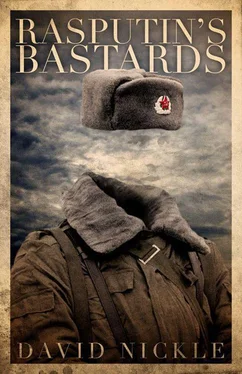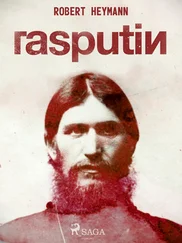“Bastards.” There was nothing for it but to shoot them. Shadak raised the little Skorpion machine pistol he kept at his belt and fired a couple of rounds all but blindly around the corner. Then he spared a glance — only to see one man down, and two others with their hands raised.
“Sir!” shouted one. “What have we done wrong?”
“You have wounded Hugo!” shouted a second. “Do not fire please!”
“Ah!” yelled the third, whose name Shadak took to be Hugo. “I am bleeding!” Shadak’s instincts kicked in, and he whirled just in time to see the three men behind him shake their heads, and begin to raise their weapons — training them on him. Shadak was quicker, and emptied the rest of the Skorpion’s clip into their bellies. Their weapons fired off harmlessly in the air as they tumbled backwards with looks of wounded incomprehension on their newly liberated faces.
Shadak swore. Those little bastards would have him kill everyone in this caravansary before they were done with him. No one could be trusted — there was no one that Amar Shadak was not better off shooting, given the manner of the attack that he was now certain had been mounted against his stronghold here.
“Well, so be it,” he said, and stooped over the bodies of his men to gather their weapons and ammunition. “I will slay them to a man, if that is how the fight is going to go. If—”
Shadak stopped dead, dropping a green satchel of ammunition, as an all too familiar pain — the infernal scratching at his grey matter — began to blossom in his skull.
“No,” said a girl’s voice. One that, like the pain, was both familiar and well inside his cranium. “No more shooting.”
Shadak felt his fingers slacken, and his waist straighten —
— ah? —
— and then he was there, in the place again: a place of intolerable joy and peace, where fingers clutched and pulled at the substance of his brain like masseurs, and his mind spread across a field of light in a relaxed and delighted puddle. Peace was short-lived, however. Transcendence coalesced into the broad stones of a plaza, in the great courtyard of the Villa. The sky was bright and his hands clenched into small, soft fists.
“I’ll skin her,” he squeaked.
Mrs. Kontos-Wu was near the end of the book and she had to say that it was a strange one. Usually, at this point, Becky and her friends would be closing in on the thief, or the kidnappers, or the smugglers. Things might look pretty perilous. But Mrs. Kontos-Wu was sure she’d never read a Becky Barker book where Becky had had to leave her best friend Bunny Miller in an abandoned warehouse bleeding from a gunshot wound, in order to save Jim from the fez-capped terrorists who’d shown they meant business by sending Jim’s severed left hand to Becky in the post. Mrs. Kontos-Wu wondered if the series had found itself a new author.
“Hey.”
Mrs. Kontos-Wu looked up from the book and smiled. Lois was back! She was there, framed in the doorway to her dormitory room. Mrs. Kontos-Wu had to shield her eyes from the light — it was certainly bright out in the hallway! Brighter than daylight. Brighter than the sun, Mrs. Kontos-Wu was willing to bet.
“Hello Lois,” she said.
“Hello,” said Lois. “Are you enjoying the book?”
“Yes. Hey — how come you’re talking like that?” Lois was speaking with a funny accent today. Or a funnier accent than her usual Bostonian drawl, anyway. She sounded like Mrs. Kontos-Wu imagined that foreign secret agent talked in Chapter Nine, before Honey had taken her out with the ice pick.
“You know why I’m talking this way,” said Lois. “You know who I am.”
Mrs. Kontos-Wu felt a wiggle in her stomach. She drew her knees up, and tried to focus back on the book. “Chapter Fourteen,” she read aloud. “‘A Necessary Evil.’”
“Snap out of it,” said Lois. “You know that this is all make-believe. It was shattered by that Kolyokov bastard. You shouldn’t come back here anymore.”
“Fuck off.” Mrs. Kontos-Wu said it before she knew what she was doing. Eyes wide, she put a hand to her mouth and drew a shocked breath. She couldn’t believe she’d just said that!
“You fuck off,” said Lois. “I was hoping to be able to count on you as a conscious operative — not have to dream-walk you through your manoeuvres. There are other things for me to be doing.”
Mrs. Kontos-Wu closed the book. She could barely make out the words anyway; the light from the hallway was literally blinding her.
“Stop it!” bawled Mrs. Kontos-Wu. “I don’t want to be a conscious operative or whatever it is you say I should be! I’m busy reading! And I happen to like it here!”
Lois stepped into the room, and reached down to take Mrs. Kontos-Wu’s hand. “Of course you like it here,” said Lois sadly. “It was made for you to like it here. But if you stay here, you’ll die.”
As Lois spoke, the light from behind her grew — tearing into the substance of the wallpaper and the rug and the little study desk in the corner, like hot flame across newspapers. Mrs. Kontos-Wu tried to cover her eyes with the book, but it was no good. The light passed through like it was made of glass.
Lois tugged at her arm. “Come on!”
Mrs. Kontos-Wu had no choice. She stood up in a dizzying rush, and stumbled forward. Lois caught her in both arms, and helped her steady herself on a floor that seemed maddeningly insubstantial.
“Now,” she said, “pay attention. We’ve been holding Shadak and his men off as best we can, pitting them against one another. But there are more than we can deal with at any one time. So you’ve got to move quickly. You’re at the base of the tower now. When I say, you’ll lead your two friends in a run out the main door. You will run to your left, where you’ll see a large gatehouse. Run through the main gate, and wait. There’s a truck that’s making its way up from Silifke. It should be here in a few minutes. When it shows up at the gate, you’ll have a minute clear where you can get into the back. Do you understand?”
Mrs. Kontos-Wu let the programming sink in. “Yes, sir,” she said.
Lois slapped her. “No! Don’t run a program through your head! That’s not how it’s going to be anymore! Do you understand ?”
“I understand,” she said.
“Then good. Now listen carefully,” said Lois. “Manka,” she said. “Vasilissa. Baba Yaga.”
Mrs. Kontos-Wu blinked. The light was gone. She was in a room at the base of the tower. There were bodies everywhere. Her eyes stung and her mouth and nose were wet.
And apparently she was propped on poor little Stephen Haber’s shoulder. “Zhanna?” said Stephen. “You’re back?”
“Who the hell is Zhanna?” said Mrs. Kontos-Wu. “Come on, kid.” She looked from Stephen to an old man, who was staring up at her with an altogether creepy awe. “You too. We’ve just got a few minutes, if we want to get out of here alive.”
The old man grinned. “Ah,” he said. “Your friend is back in herself. See?” Stephen squinted at her. “Are you?” he asked. “No bullshit this time?”
Mrs. Kontos-Wu thought about that — about exactly where she was; whether this was herself really; and whether the bullshit was finished or not — but immediately pushed it down again.
“No bullshit.” She said it uncertainly, but Stephen’s relieved smile showed he hadn’t picked up on it. That kid could be dense some days, no doubt about it.
Together, the three of them climbed down the rest of the stairs and made a break for the arched doorway at the tower’s base.
Shadak awoke with a mouthful of brackish spit and a sharp lump travelling down his throat. The lump was, Shadak knew with doomed certainty, the key to the padlock that held the chains in place around his shoulders and wrists and ankles. He let out a volatile stream of curses. The two men who stood over him looked down at him apologetically.
Читать дальше












